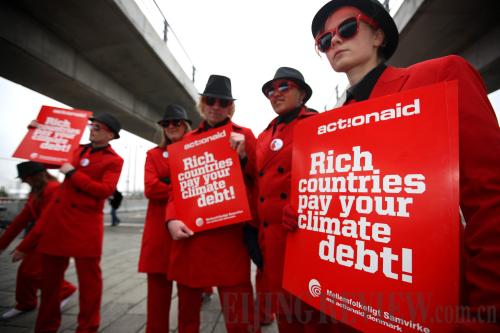|
The industrial nations stated they were willing to reduce their greenhouse gas emissions by 2 degrees or less. That, according to the UN, is not enough to keep the rise in the global average temperature under control. Scientists say it will leave millions of people suffering from hunger, diseases, floods and water shortages.
 |
|
CLIMATE DEBATE: Environmentalists stage a protest outside the main venue of the UN climate change conference in Copenhagen, Denmark, on December 9, 2009 (XIE XIUDONG) |
Shortly before the end of the conference, 106 countries publicly opposed the industrial nations' position on emissions cuts. They represented Africa, small island states, least developed countries and South America's Bolivarian Alliance, which constituted the majority of the parties to the conference.
The UN's research shows Africa and small island nations are the ones being hit hard by natural disasters caused by rising temperatures. Leaders of the industrial world acknowledge that millions of people in poor countries are suffering the most from the impacts of climate change, yet they remain reluctant to take drastic measures on emissions.
Like many other leaders from the developing world, Brazilian President Lula raised his concerns about the vulnerability of Africa and small islands to the impacts of climate change and urged rich nations to finance mitigation and adaptation efforts in poor countries.
"It's necessary to keep commitments on emissions cuts and financing," he told the leaders of industrial countries and reminded them of their obligations under the Kyoto Protocol, which makes a clear distinction between the developed and developing nations and sets different tasks for both to address climate change.
Since the industrial countries are responsible for about 80 percent of atmospheric pollution, under the Kyoto Protocol, the first commitment period of which will expire in 2012, they are obliged to take greater responsibility than those nations that are not fully industrialized.
Negotiators held that most countries in Africa and small island nations are least responsible for atmospheric pollution, and are therefore justified in demanding enhanced commitments from rich nations on emissions reduction.
For their part, the industrial nations have indicated their willingness to set up a $100-billion-a-year fund for developing countries. The developing nations have welcomed the proposal but, at the same time, made it clear they would not compromise on the question of emissions cuts.
The developing countries want the rich countries to cut emissions by 25 percent by 2020. Currently, no industrial nation seems willing to accept this demand. Instead, the developed countries are calling for major developing economies, such as China and India, to curb their own, no matter whether they have adequate resources or not.
Without naming China and India, the industrial nations emphasized that developing countries must reveal their records on emissions cuts to the international community. "For certain countries, transparency is off the table, which is unacceptable," said U.S. Secretary of State Hillary Clinton at the summit.
But emerging economic powers have flatly rejected this demand, arguing they are not equally liable for growing levels of carbon emissions. India said it wants to protect its future economic growth, and declared it would commit only to slowing the growth of its carbon emissions. India also said it would not accept a legally binding target.
Despite having limited resources, however, both China and Brazil have pledged financial support for poor countries in the fight against global warming.
Although millions of people in Brazil remain poor, "we will give money to help other countries," President Lula told world leaders in reference to international efforts to set up a fund for Africa and other countries that are becoming increasingly vulnerable to the impending threat of global warming.
The Inter-governmental Panel on Climate Change says that Africa will warm around 1.5 times the global average temperature increase. Therefore, average warming of 2 degrees Celsius globally could entail warming of around 3 degrees in Africa, which, says South Africa's Nobel laureate Archbishop Desmond Tutu, is to "condemn Africa to incineration."
"Africa is paying with the misery and death of its people for the wealth and well-being that was created in the developed countries through carbon-intensive development," said Ethiopian Prime Minister Meles Zenawi, who spoke at the summit on behalf of the African bloc. "That is fundamentally unjust."
In reflecting on the summit outcome, Michael Dorsey, professor of environmental studies at Dartmouth College in the United States, concluded that in the two weeks in Copenhagen and nearly two decades, the developing countries braved not only "backsliding," but also "non-commitments, and sycophantic posturing of the industrialized world as wealthy nations have sought to gut both the UNFCCC and Kyoto Protocol."
In his view, during the Copenhagen talks, small island states and African nations were able to get nothing but one thing: "They held the very high moral and ethical ground."
(Reporting from Copenhagen, Denmark)
The author is a UN correspondent | 